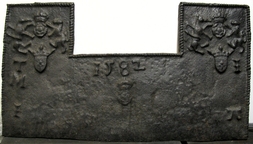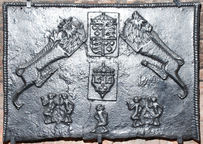-
84
Description: Arched rectangular shape; ‘egg and dart’ ovolo moulding visible on top and sides; shield, helmet, crest, mantling and supporters of the Mohun family.
Notes: Cast from a finely carved pattern, the supporters denote these are the arms of a peer. The crest is: Gules, a maunch ermine, with a hand proper holding a fleur de lys or. Egg and dart moulding is rare and examples (at Maidstone and Burwash) may be the work of the same pattern maker. From Sidney Farm, Alfold, Surrey; Reginald Mohun (pron. Moon) of Dedisham, Slinfold, Sussex, was husband of Elizabeth Blounte of Dedisham c.1636. Bottom missing due to corrosion.
Copies of this fireback are known.
Arms: Mohun family, barons of Okehampton
- Decoration tags:
- rectangular with round arch (shape)
- ovolo, egg and dart (edging)
- whole carved pattern
- heraldic
- armorial
Manufactured: in the early- to mid-17th century in England.
Current location: Guildford Museum, Guildford, Surrey, England.
Museum number: G.7106 (part of the Guildford Museum museum group)
- Attached to series:
- Personal armorial firebacks
- Mohun series
-
107
Description: Rectangle with two similar rectangular extensions at top extremities; rope edging (top and sides); on top extensions, two stamps of a dragon and lion supporting a rose and crown, each with a crowned shield bearing a fleur de lys below; central date with rose and crown below; initials TM vertically placed inside middle left edge, initial I middle right; initials I and A, respectively, at lower left and right.
Notes: The initials, TM and I, may relate to a married couple, the first two letters to their first names and the last to their surname; the initials IA are likely to be of the founder as they appear in the same arrangement on other firebacks. The unusual shape would probably have been determined by the structure of the hearth for which it was made; the rose and crown and supporters stamp can also be seen on a large fireback, dated 1593, formerly at Baynard's Park, Surrey (no. 200); the date and IA stamps can be seen, in identical form, on a fireback in the Victoria & Albert Museum, and on two other firebacks, suggesting a common source for all of these firebacks.
Inscription: TM 1582 I / I A
- Decoration tags:
- rectangular with two arches (shape)
- rope (edging)
- carved stamps
- individual letters
- individual numbers
- heraldic
- royal
- text
Manufactured: in 1582 possibly at Pounsley Furnace, Framfield in the Weald area of England.
Current location: Haslemere Educational Museum, Haslemere, Surrey, England.
Museum number: 8582 (part of the Haslemere Educational Museum museum group)
Citation: Anon., 1929, 'An interesting fireback', Sussex Notes and Queries, 2, 8 , p. 242.
- Attached to series:
- 1582 IA series
- Pounsley series
-
345
Description: Rectangular; twisted rope edging (top and sides); from top, crowned Tudor royal shield (stamp overpressed) above crowned shield bearing initials, KH in Lombardic lettering, above a fleur de lys (stamp overpressed); to left, diagonal lion passant guardant sinister; to right, diagonal lion passant; at base, single 'imp' figure, arms to side, moving left but facing right, between two pairs of 'imp' figures (separately stamped), one moving left, right arm raised, the other moving right, right arm raised.
Notes: One of the 'Royal' series.
Arms: Tudor royal arms of England
- Decoration tags:
- rectangular (shape)
- rope (edging)
- carved stamps
- heraldic
- armorial
- animals
- humans
Manufactured: in the mid-16th century in the Weald area of England.
Current location: Ightham Mote, Ightham, Kent, England.
Museum number: 825393 (part of the National Trust museum group)
- Attached to series:
- Royal series
-
643
Description: Rectangular, with canted top corners; twisted rope edging (top and sides only); eight shields of Ayloffe impaling Sulyard in three rows, 3-2-3; Ayloffe: sable, a lion rampant Or, collared gules, between three crosses formy of the second; Sulyard: argent, a chevron gules between three pheons inverted sable.
Notes: William Ayloffe (c1535-1584) of Bretons, Hornchurch, Essex, Justice of the Court of Queen’s Bench, married (c1560) Jane, dau. of Sir Eustace Sulyard, of Runwell, Essex. Christie's Masters and Makers Sale, South Kensington, 30 Nov 2010, lot 518 (£1,000).
Copies of this fireback are known.
Arms: Ayloffe impaling Sulyard (William Ayloffe of Bretons, Hornchurch)
- Decoration tags:
- rectangular with canted top corners (shape)
- rope (edging)
- carved stamps
- armorial
Manufactured: in the early-17th century in the Weald area of England.
Current location: not known.
- Attached to series:
- Ayloffe series
- Personal armorial firebacks



